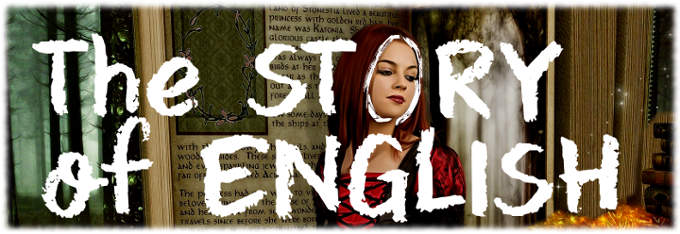WITH AUDIO. ►: Click to open/close audio player
A short history of English

Were
you looking for short stories in
English? If so,
► click for Short stories in English
Short and very short stories for intermediate level and advanced level learners of English (Levels B1, B2 and C1)
► click for Short stories in English
Short and very short stories for intermediate level and advanced level learners of English (Levels B1, B2 and C1)
The story of English, and how it became a world language
English is the world's leading international language. It is the principal language spoken in Britain, the USA, Canada, Australia, New Zealand, and some other countries such as Uganda and Botswana. Almost 400 million people in the world speak English as their first language (estimates of the exact number vary considerably) - about the same number as Spanish, but less than Mandarin Chinese or Hindi.In addition, over 1,000 million (1 billion) people worldwide speak English as a second language. Many more can get by in English.
English is the main second language in India, South Africa and many parts of Africa and Asia. But - more and more - it is also the language of international commerce, of business, of diplomacy and of tourism.
The short history of English
How did English reach the special position in which it finds itself today? Mostly, the rise of English to its position as the world's main international language was a result of chance. Britain was the world's most active colonial nation in the 19th century, and British explorers and colonists took their language with them wherever they went. English became the official language of most of Britain's colonies. Since the 20th century, America has been the world's most powerful nation - and Americans have brought the English language to other countries of the world.The importance of American international corporations has made sure that English has remained the international language of business; and Hollywood and the music industry have made sure that it has become the principal language for the media and showbiz.
The success story of English has been due partly to the nature of the language, but more to the fact that it had developed into a mature national language just when the countries of Europe were beginning to expand their influence and spread their culture all over the world.
Best-sellers from Linguapress
In those days, England was a Germanic country; its people spoke a variety of Germanic languages including forms of Danish and Anglo Saxon, as well as some Celtic languages.
In 1066, England was conquered by the Normans, from France, who brought with them their own language - Norman French - a Romance language.
In the years that followed, the nobility of England spoke French and read Latin, while the ordinary people spoke varieties of old English; but since they existed side by side, the two languages immediately began to influence each other. Norman French became Anglo-Norman, and Old English, picking up lots of vocabulary from Anglo-Normans, evolved into Middle English. Middle English was thus rather different from other European languages. It was partly Germanic (particularly the vocabulary of everyday life, the grammar and structures), and partly Romance (a lot of the more literary vocabulary). It was even influenced to a small degree by the Celtic languages which remained alive in Cornwall and other parts of the British Isles.
Eventually, since Middle English was spoken by far the largest part of the population, it became the dominant language in England; and by the 14th century, it was well on the way to becoming the national language, not just for everyday life, but for administration and literature too.
Finally, English also replaced Latin as the language of the church. The Bible had been translated into English in the 14th century; but it was not until the Protestant reformation of the 16th century, the age of Shakespeare, that English became the language of church services. From then on, its position as the national language of Britain, was firmly established. And it was just at the right moment.
English became the established national language just at the point in history when colonial expansion was beginning. It was the spoken and written language of the first men and women from Britain to settle in the Americas; and it was a language that went round the world with England's early traders, commercial adventurers and missionaries.
By the year 1700, England had become the world's leading nation in terms of international trade, ensuring that the English language was taken all over the world as the principal language of international commerce.
Understanding English
Since English is at the dividing line of the two principal families of language used in Western Europe today, most people from Spain to Scandinavia can recognise something of their own language in English.For example, if you speak a Germanic language (German, Dutch, or a Scandinavian language), you do not need to have learned much (or even any) English to understand this sentence:
The man forgot to water his garden last night
Anyone who speaks French or Spanish or Italian, should be able to understand this English sentence without too much difficulty:
Indicate if you have a serious problem.
As English is half way between two different language groups, speakers of other languages have often found it easy to communicate in English, even without paying attention to grammar!
Nevertheless, grammar is important; for without grammar, no language can survive. Grammar is the cement with which the bricks of language are held together. Without it, even messages in simple English can be quite impossible to understand.
Just look at the importance of word order in these simple examples, which are entirely different in meaning:
The man the woman saw was hungry.
The man saw the woman was hungry.
Or look at the radical difference in meaning between these two sentences:
This is a story forgotten by Charles Dickens.
This is a forgotten story by Charles Dickens.
Modern English
In recent times, as English has become a global language, used in different places all over the world, it has become a much richer language than in the past. It has picked up new words from other cultures, other languages, such as bungalow (from India), détente (from French), kebab (from Turkey), potato (from American Indian) - plus a lot of modern slang from America.Today, both grammar and vocabulary are still changing. There is no such thing as "official English"; neither Britain nor the USA has anything official like the "Académie Française" to decide what is acceptable and what is not. The most accepted sources of reference are the famous English dictionaries - Websters for the USA and the Oxford English Dictionary for British English. Like other dictionaries however, they are descriptive not prescriptive - i.e. they describe language as it is used, they do not tell people what they can or should say or should not say... and they do not always agree!
Today's English is different from the English of 100 years ago; it is pronounced differently too - and no doubt, it will be even more different in 100 years' time.
► List of terms - a glossary of grammar terms
Copyright © Andrew Rossiter - Linguapress.
Copying and printing permitted only for personal study, or by teachers for use with their students


 Copyright
information.
Copyright
information.